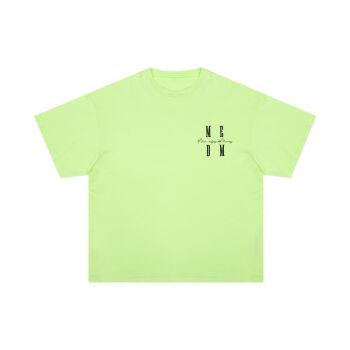When customizing T-shirts, it is very important to understand the weaving process of the fabric, because the weaving process is directly related to the texture, feel, breathability and durability of the fabric. The following are the characteristics of different weaving processes:
1. Plain weave/plain weft: This is one of the most common weaving processes and is characterized by interwoven yarns At a 45-degree angle, it shows a clear parallel line texture. Plain fabric generally has better strength and durability and can be used for various types of T-shirts.
2. Twill: Twill is made by cross-weaving yarns at a 45-degree angle. It generally has better stretch and extensibility properties than plain weave, making the garment more comfortable and flexible. The texture of twill has distinct diagonal lines, giving the fabric a unique personality.
3. Mesh cloth: Mesh cloth is a weaving process with good air permeability. It is usually based on plain weft fabric, with a unique fabric structure formed by adding mesh. Mesh fabric can provide good breathability and moisture dissipation, so it is suitable for use in clothing that requires good ventilation, such as sports T-shirts.
4. Twill peach skin cloth: The surface of this technology gives people a velvet feel, soft and comfortable feel, and is very suitable for making casual T-shirts. The appearance of twill peach skin cloth is relatively simple and practical, while balancing ease and luxury.
5. Knitted fabric: Compared with fabric, knitted fabric is knitted by knitting machine. It is generally more stretchable and elastic, and more breathable. Common knitted fabrics include cotton, polyester, wool, etc. Different materials can be selected according to the desired style.
6. Calico: Calico is made by printing pigments or dyes on fabric to form patterns or words. It can be personalized according to the designer’s creativity, making the T-shirt more unique and distinctive.
7. Blended fabric: Blended fabric is a mixture of two or more different fibers. Common blends include cotton, linen, cotton-polyester, etc. Each of them has different characteristics. After blending, it can combine various advantages while avoiding disadvantages, such as increasing elasticity and comfort, improving durability, etc.
It should be noted that the choice of weaving process not only depends on personal preference, but also factors such as functional requirements and seasonality of the fabric should be taken into consideration. When customizing a T-shirt, it is recommended to negotiate with the manufacturer or fabric supplier to understand and choose the weaving process and fabric that suits your needs.









